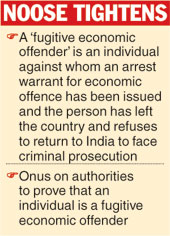
New Delhi, May 18: The government today came out with a draft legislation to confiscate properties of "fugitive economic offenders" who flee the country to escape the law.
The provisions of the proposed Fugitive Economic Offenders Bill, 2017, once passed by Parliament, will override other legislations dealing with economic offences.
The move comes days after the Supreme Court found liquor baron Vijay Mallya guilty of contempt and asked him to appear before it on July 10, an order expected to help India's case to seek his extradition from the UK.
"It is widely felt that the spectre of high-value economic offenders absconding from India to defy the legal process seriously undermines the rule of law in India," the finance ministry said in a statement.
"It is, therefore, felt necessary to provide an effective, expeditious and constitutionally permissible deterrent to ensure that such actions are curbed," it added.
According to the draft law, a "fugitive economic offender" means any individual against whom a warrant for arrest in relation to an economic offence has been issued and the person has left the country and refuses to return to India to face criminal prosecution.
It further proposes that the burden of proof for establishing that an individual is a fugitive economic offender will be on the authorities.
"The confiscation order of the Special Court will, to the extent possible, identify the property that constitutes proceeds of crime which are to be confiscated and in case such properties cannot be identified, quantify the value of the proceeds of crime," it said.
The proposed law is to provide for measures to deter economic offenders from evading Indian law by remaining outside the jurisdiction of Indian courts, "thereby preserving the sanctity of the rule of law in India".
In his 2017-18 budget speech, finance minister Arun Jaitley had said that the government was planning to introduce legislative changes or even a new law to confiscate the assets of such absconders till they submitted to the jurisdiction of the appropriate legal forum.
He had said that in the recent past, there had been instances of big time offenders, including economic offenders, fleeing the country to escape the reach of law.
"We have to ensure that the law is allowed to take its own course," he had said.
Mallya, the 61-year-old chief of the erstwhile Kingfisher Airlines who owes over Rs 9,000 crore to various Indian banks, had fled India to escape legal proceedings in connection with the loans.
"This bill is expected to improve the financial health of various banks, which are suffering from high level of NPAs and will help build confidence in the country about equality of law that even high profile defaulters cannot escape the clutches of law," Rakesh Nangia, managing partner, Nangia & Co said.










